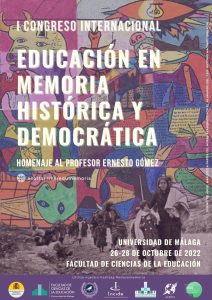 EDUCATION IN HISTORICAL AND DEMOCRATIC MEMORY
EDUCATION IN HISTORICAL AND DEMOCRATIC MEMORY
TRIBUTE TO PROFESSOR ERNESTO GÓMEZ
Faculty of Educational Sciences
University of Malaga, Spain
October 26-28, 2022
Desde febrero de 2020, en la Facultad de Ciencias de la Educación de la Universidad de Málaga, EDUSOC (Grupo de Investigación HUM 856 Educación Social y Ciudadana) organiza las Jornadas Memoria y Olvido en la Enseñanza de la Historia, junto a la asociación INCIDE (Inclusión, Ciudadanía, Diversidad y Educación), con el apoyo del Consejo Social de la universidad y la Asociación contra el Silencio y el Olvido y por la Recuperación de la Memoria Histórica de Málaga. De esta forma desarrollamos y visibilizamos prácticas formativas y docentes en torno a Lugares de la Memoria Democrática relevantes para la historiografía, pero desconocidos para la práctica educativa. Abordamos el fenómeno de la Desbandá o la huida de población civil de las tropas sublevadas que la bombardea por tierra, mar y aire, dando lugar al que es reconocido como el episodio más cruento de la Guerra Civil, con una cifra indeterminada de 3000 a 5000 víctimas. Cuenta con un especial tratamiento el antiguo Cementerio de San Rafael, la mayor fosa común en Europa Occidental, al haber sido escenario de la represión ejercida por los bandos contendientes y hasta los años 50, durante la Dictadura Franquista. El trabajo arqueológico ha descubierto 9 fosas comunes, 4300 víctimas identificadas, 2800 cuerpos recuperados, entre ellos 300 infantiles, muertos en la Cárcel de Mujeres.
En esta ocasión, con ayuda de la Secretaría de Estado de Memoria Democrática, celebraremos el I Congreso Internacional sobre Educación en Memoria Histórica y Democrática para participar en el debate público abierto, a causa de la tramitación parlamentaria y aprobación de la Ley de Memoria Democrática. Un evento científico de estas características puede aportar elementos de discusión vinculados con el Cap. IV Del deber de Memoria Democrática, en concreto relacionados con el artículo 56 Cumplir la importante misión educativa y de trasmisión de valores. A ello se suma la aprobación de los Reales Decretos de la LOMLOE, que siguiendo el artículo 45 de la anterior ley, recoge medidas en materia educativa como la actualización de contenidos curriculares y formación del profesorado.
Con todo ello queremos contribuir a visibilizar prácticas educativas, pero sobre todo a impulsar una investigación que aborde los desafíos éticos del futuro, la construcción de conciencia histórica y ciudadanía democrática. Esa tarea no podemos abordarla sin reflexionar e investigar de forma sistemática sobre cómo y por qué se abordan en el aula pasados en conflicto. El profesorado y el alumnado se debate en ese contexto, entre problemas pedagógicos y políticos, pero también a reacciones afectivas, a frustraciones y confusiones que necesitamos conocer para avanzar en el conocimiento didáctico.
+++++
Since February 2020, at the Faculty of Educational Sciences of the University of Malaga, EDUSOC (Research Group HUM 856 Social and Citizen Education) organizes the Memory and Forgetfulness Conference in the Teaching of History, together with the INCIDE association (Inclusion, Citizenship, Diversity and Education), with the support of the Social Council of the university and the Association against Silence and Oblivion and for the Recovery of the Historical Memory of Malaga. In this way we develop and make visible training and teaching practices around Places of Democratic Memory relevant to historiography, but unknown to educational practice. We address the phenomenon of the Desbandá or the flight of the civilian population from the rebel troops that bombard it by land, sea and air, giving rise to what is recognized as the bloodiest episode of the Civil War, with an undetermined figure of 3,000 to 5,000 victims. The old San Rafael Cemetery, the largest mass grave in Western Europe, has received special treatment, as it was the scene of the repression exerted by the contending sides and until the 1950s, during the Franco dictatorship. Archaeological work has discovered 9 mass graves, 4,300 victims identified, 2,800 bodies recovered, including 300 children, who died in the Women’s Prison. during the Franco dictatorship. Archaeological work has discovered 9 mass graves, 4,300 victims identified, 2,800 bodies recovered, including 300 children, who died in the Women’s Prison. during the Franco dictatorship. Archaeological work has discovered 9 mass graves, 4,300 victims identified, 2,800 bodies recovered, including 300 children, who died in the Women’s Prison.
On this occasion, with the help of the Secretary of State for Democratic Memory, we will celebrate the I International Congress on Education in Historical and Democratic Memory to participate in the open public debate, due to the parliamentary processing and approval of the Democratic Memory Law. A scientific event of these characteristics can contribute elements of discussion linked to Chap. IV Of the duty of Democratic Memory, specifically related to article 56 Comply with the important educational mission and transmission of values. Added to this is the approval of the Royal Decrees of the LOMLOE, which, following article 45 of the previous law, includes measures in educational matters such as updating curricular content and teacher training.
With all this we want to contribute to making educational practices visible, but above all to promote research that addresses the ethical challenges of the future, the construction of historical awareness and democratic citizenship. We cannot tackle this task without systematically reflecting and investigating how and why conflicting pasts are addressed in the classroom. Teachers and students debate in this context, between pedagogical and political problems, but also affective reactions, frustrations and confusions that we need to know to advance in didactic knowledge.
#edusocmemoria